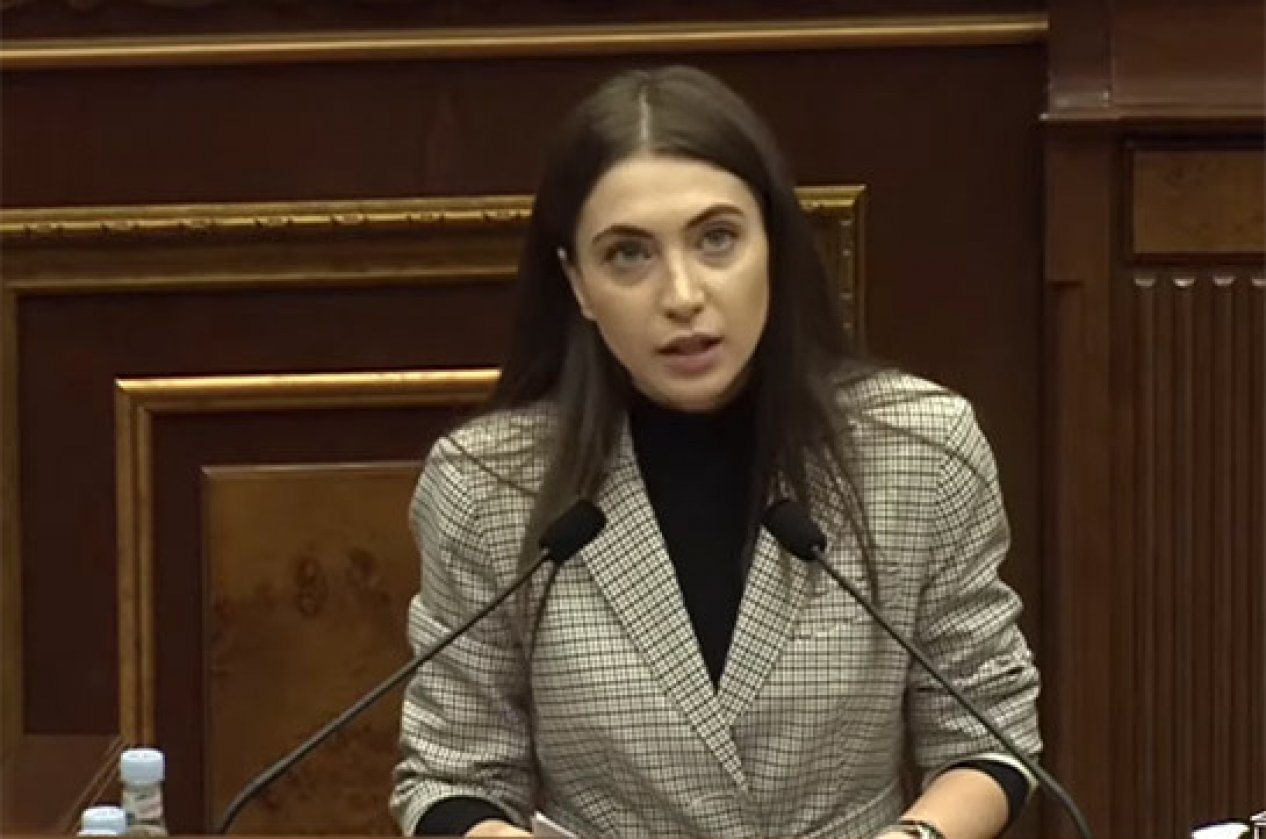
Anna Mkrtchyan, a member of the “I have Honor” faction, speaking in the Armenian parliament, has recently presented how Armenian captives are treated in Baku prisons and quoted an excerpt from the report of the Human Rights Defender of Armenia.
“Today I will cite quotes from the statements of the prime minister and other people in power. They said: the prisoners can stay in Baku for a couple of months. Another one stated that in Baku prisons the Armenian captives are treated very well and are kept better than in our country,” Mkrtchyan said in the parliament.
“Separate groups have been created to beat the Armenian prisoners, they beat them until the Armenians lose consciousness, then they wait for them to regain consciousness, and continue to beat them again. Azerbaijanis pour boiling water and hot tea over the Armenian prisoners, after the burns they begin to beat them until they die. After death, the body is left in the cell for several days. They give only 10 seconds to eat food, force them to eat from the ground, spit on food, and then force them to eat it, cut off body parts, tie them alive to cars and drag them along the ground, deprive them of water, sleep and food,” the deputy finished the quote.
After Anna Mkrtchyan’s speech, dissatisfaction of the deputies of the Civil Contract faction began in the hall. Then Speaker of the Parliament Alen Simonyan intervened, who considered the facts presented in the Ombudsman’s report to be “fictional.”
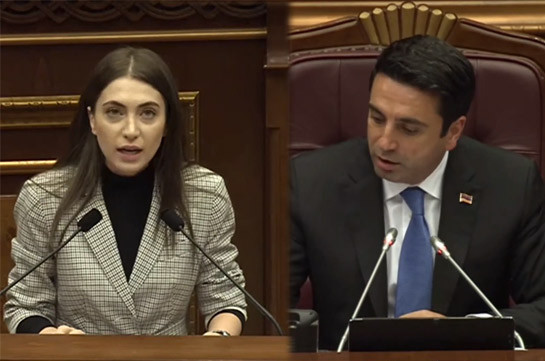
“To be honest, I didn’t understand why it was necessary to present these fictitious pictures in the parliament,” Simonyan said.
Later, referring to the statement of Speaker of the Parliament Alen Simonyan, Anna Mkrtchyan told reporters: “From the rostrum of the parliament, so that the whole world can hear, it should be announced that the citizens of the Republic of Armenia, Armenian captives are being tortured in Baku prisons, and this in no way can be considered as a ‘positive signal’ from an Azerbaijani or a Turk, as Nikol Pashinyan said.”
At first, Faktyoxla Lab. has tried to figure out what kind of Armenian prisoners Anna Mkrtchyan is talking about.
To begin with, according to paragraph 8 of the trilateral statement signed by the Presidents of Azerbaijan and Russia, as well as the Prime Minister of Armenia on November 10, 2020 following the Second Karabakh War, the parties pledged to exchange prisoners of war, hostages and other detained persons, as well as the bodies of the dead.
From the beginning of December 2020, the fulfillment of commitments began. On December 4, the parties presented the list of prisoners to the International Committee of the Red Cross (ICRC). On December 14, the first exchange of prisoners took place with the participation of the leadership of the Russian peacekeepers. Subsequently, the exchange of prisoners was repeatedly carried out. The Azerbaijani side has repeatedly stated that it fulfilled its commitments in accordance with the trilateral agreement and returned all prisoners of war to Armenia.
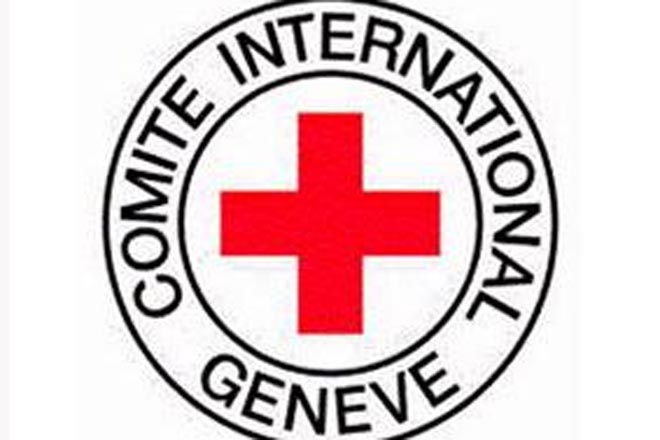
As for the other ‘prisoners,’ whose return the Armenian side demands from Azerbaijan, these persons were sent to the territory of Karabakh after the agreement of November 10, where they committed armed provocations. Thus, in a joint statement by the Azerbaijani Defense Ministry and the State Security Service, it was said that on November 26, 2020, in the liberated village of Sur in the Khojavend region of Azerbaijan, the Armenian servicemen carried out a sudden attack on the servicemen of the defense ministry in this territory, as a result of which four servicemen were killed and two more were wounded.
Also, on December 8, during the installation of communication devices and transmitting equipment in the area of Hadrut settlement, as a result of the attack of the Armenian armed forces, one Azerbaijani serviceman was killed, and an employee of Azercell company was seriously wounded. The report noted that after that the State Security Service of Azerbaijan had to conduct an anti-terrorist operation on this territory.
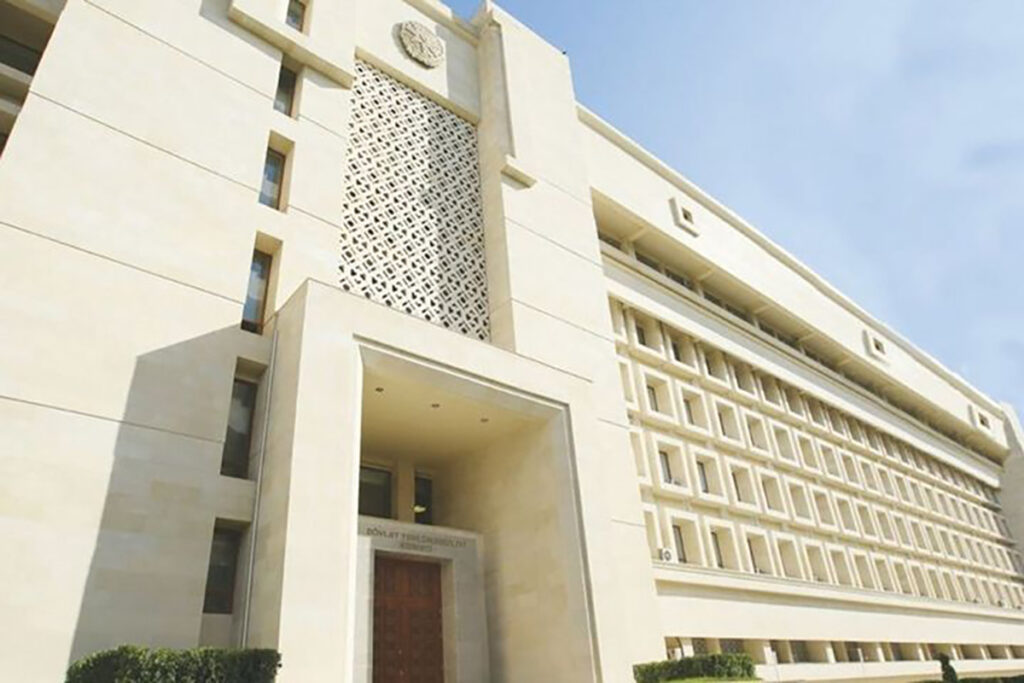
Then Baku turned to the UN Secretary General in connection with this incident. The letter, sent on behalf of Azerbaijani Foreign Minister Jeyhun Bayramov, says that after the signing of the trilateral statement of November 10, Armenia is engaged in activities that threaten peace in the region. The letter emphasizes that the Armenian Armed Forces are carrying out sabotage activities on the territory of the Khojavend region. As a result of the anti-terrorist operation carried out by the relevant structures of Azerbaijan, members of the sabotage group, consisting of 62 people, who are citizens of Armenia, were detained. The investigation established that they were brought to Karabakh from the Shirak region of Armenia. The Azerbaijani side has repeatedly stated that these are the only Armenians who are in prison and refuses to consider them prisoners of war.
In mid-January 2021, this issue was mentioned in a statement by Russian Foreign Minister Sergey Lavrov. Speaking about the problems that arose in the process of the exchange of prisoners between Azerbaijan and Armenia, the Russian minister touched upon this issue, noting that since the mentioned group was sent to the territory that came under the control of Azerbaijan at the end of November, they are not considered in the context of the trilateral statement that put an end to the military actions in Karabakh. On November 20, Russian Defense Minister Sergey Shoigu reported to President Vladimir Putin on the completion of the deployment of the Russian peacekeeping contingent in Karabakh, long before the date of the anti-terrorist operation of the Azerbaijani security forces and the arrest of the Armenian military.
“The statement on November 9 envisaged the release of prisoners of war who were in captivity at that time. Now Azerbaijan is keeping a significant part of the group of Armenian servicemen who appeared there after the statement entered into force and an agreement was reached to end hostilities,” Lavrov said during a joint press conference with Armenian Foreign Minister Ararat Mirzoyan on August 31 this year.
With regard to international humanitarian law, issues related to prisoners of war are governed by the Geneva Conventions. According to article 118 of the 1949 Geneva Convention, after the end of the war, prisoners of war must be released and sent to their countries. Also, prisoners of war are not responsible for their direct participation in hostilities.
At the same time, according to the basic principle of international humanitarian law, as well as the protocol annexed to the Geneva Convention of 1977, this requirement applies directly to persons captured during the period of hostilities. This is while the sabotage group, consisting of citizens of Armenia, was sent to the territory of Azerbaijan precisely after an agreement on the cessation of hostilities was reached, and they committed terrorist acts.
Now let’s look at the allegations of Armenian MP Anna Mkrtchyan about the mistreatment of Armenians in places of detention in Azerbaijan.
Firstly, Anna Mkrtchyan in her speech refers to the report of Ombudsman of Armenia Arman Tatoyan, who, both during the Second Karabakh war and after it, was more than once caught in publishing and voicing unsubstantiated and fictitious facts.
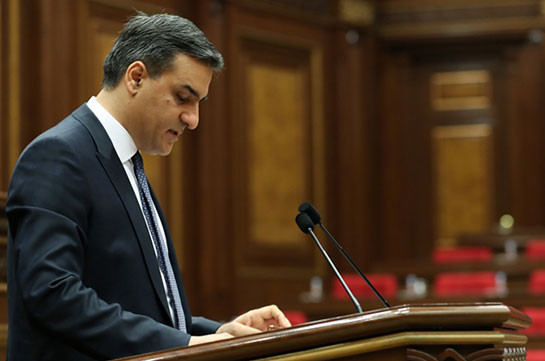
Secondly, it is not the first time that the topic of “mistreatment of captured Armenians” has been raised. At the end of March this year, the international organization Human Rights Watch released a report claiming ‘cases of mistreatment of Armenian prisoners of war.’ The Azerbaijani side promptly rejected these allegations. The country’s Foreign Ministry issued a statement in which, in particular, it was noted that “all Armenian prisoners of war and civilians who were held in Azerbaijan were treated in accordance with the requirements of the 1949 Geneva Conventions. They were not subjected to torture, humiliating or ill-treatment, they were provided with the necessary medical assistance, and during the period of detention, each of them underwent a medical examination. During this examination, no traces of damage were found (with the exception of injuries sustained in the course of hostilities).”
Thirdly, Maral Najaryan, an Armenian of Lebanese origin, has recently returned to Armenia from Lebanon.
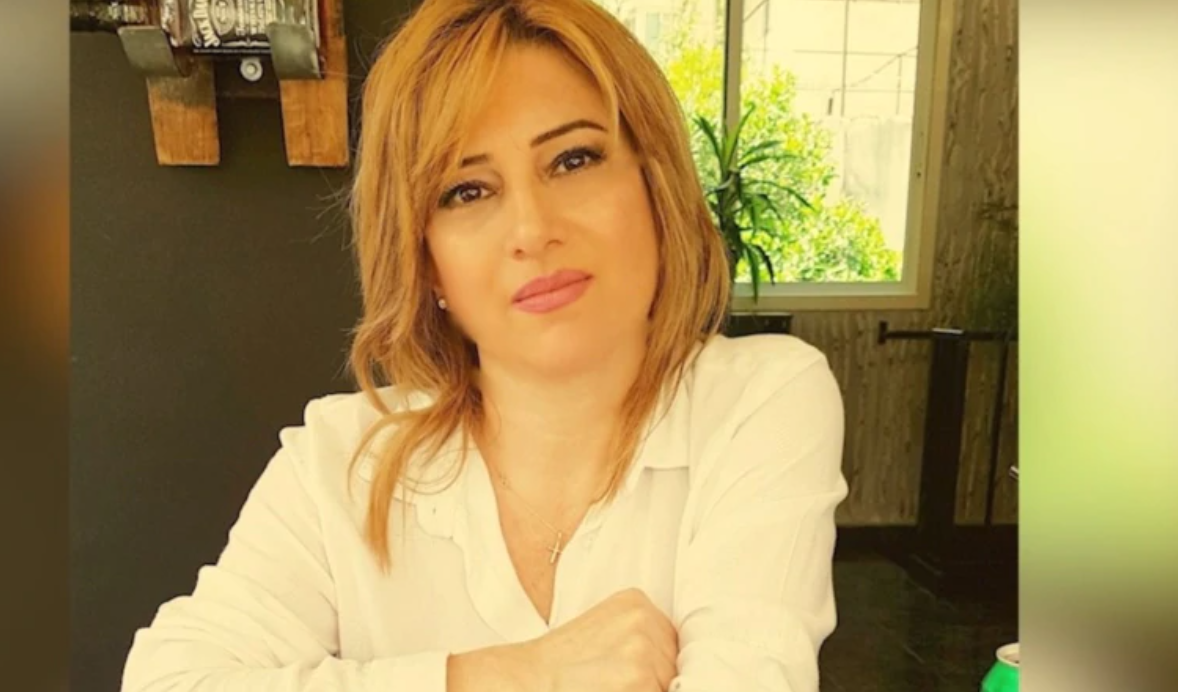
Najaryan, along with her common-law husband, were detained by the Azerbaijani military the next morning after signing a trilateral statement on Karabakh on November 10 in the vicinity of Shusha, since their movements in the combat zone, although stopped at that time, aroused fair suspicions. The fact is that, for no apparent reason, they went to Shusha, previously liberated by the Azerbaijani Armed Forces as a result of fierce battles. She was released following the investigation and returned to Lebanon, despite the second citizenship she received in Armenia. Subsequently, Maral Najaryan confirmed that the Azerbaijanis treated her quite well, which denied the reports of Armenian sources that her testimony was allegedly obtained under pressure. During the investigation, it was also found out that her husband, Lebanese citizen Vigen Euljekchyan, fought in Karabakh as a mercenary on the side of Armenia. Numerous photos from the war zone, where he was captured in the field with a military weapon in his hands, as well as the testimonies of a number of eyewitnesses, leave no room for doubts, which the Armenian side is still trying to sow in the world. The Armenian Service of Radio Liberty (Azatutyun) made a report on Maral Najaryan, who returned to Armenia, and who again noted that she was treated humanely in Baku. The same attitude was shown towards other detainees.
Fourthly, the Azerbaijani side has repeatedly stated that the allegations that the detained Armenians are being bullied are absolutely groundless. In accordance with international law, representatives of the International Committee of the Red Cross, the ombudsman for human rights, are allowed to visit them, documents on the state of health of all arrested citizens of Armenia are provided.
There was no mention of ill-treatment of the detained Armenians in any of the statements of the Red Cross.
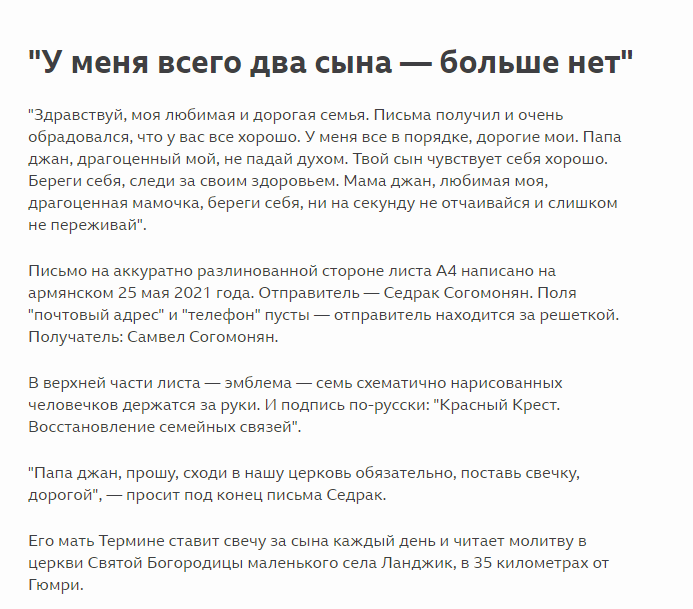
And, finally, there are photos of the detainees who returned from Azerbaijan to Armenia, which testifies to their physical well-being.
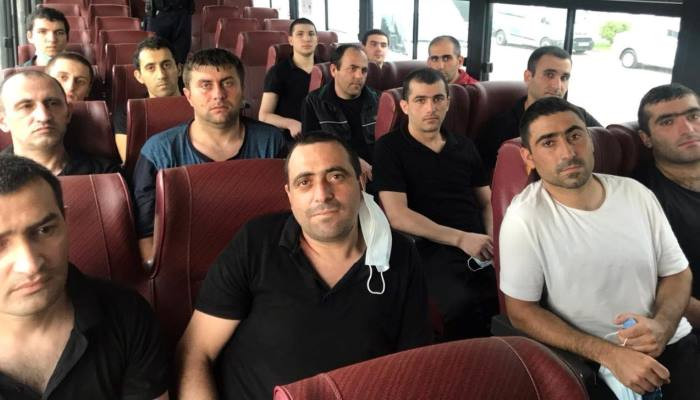
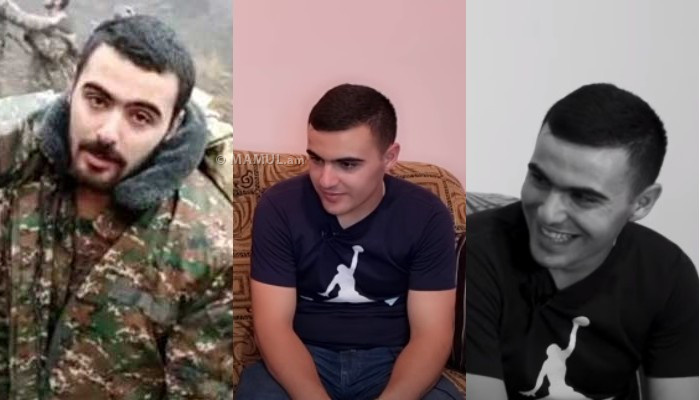
Thus, taking into account the above-mentioned facts, it is safe to say that the statements of MP Anna Mkrtchyan that “Armenian captives are tortured in Baku prisons” aren’t substantiated in any way and are false. In fact, the Armenian MP presented “fictitious pictures” in the parliament, based on the facts presented in the report of the Armenian Ombudsman, which the speaker of the parliament Alen Simonyan called fictional.




















